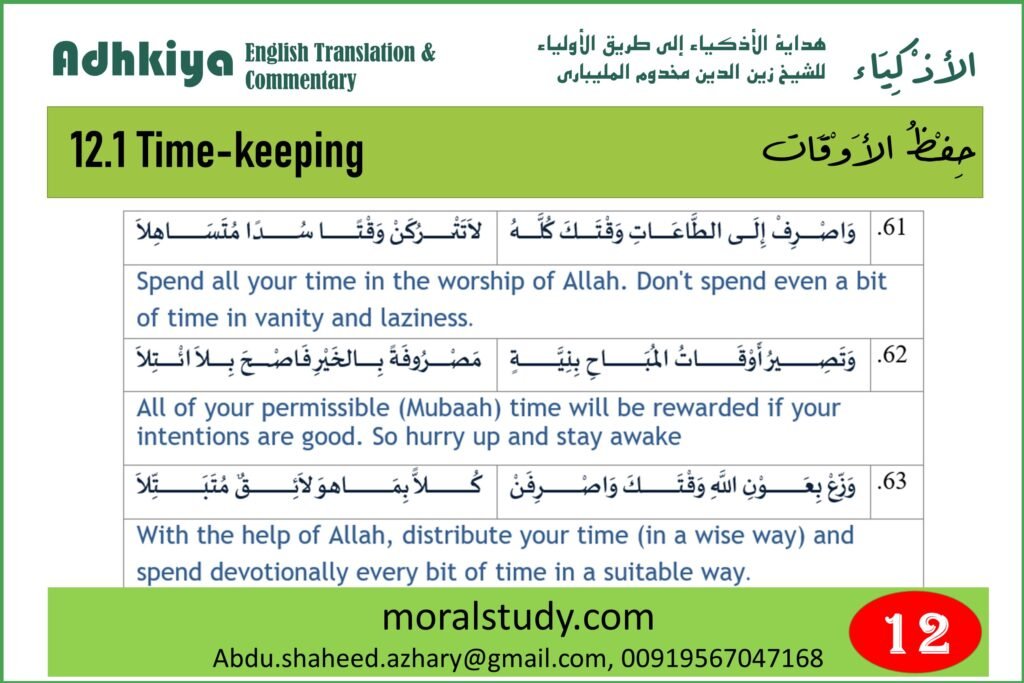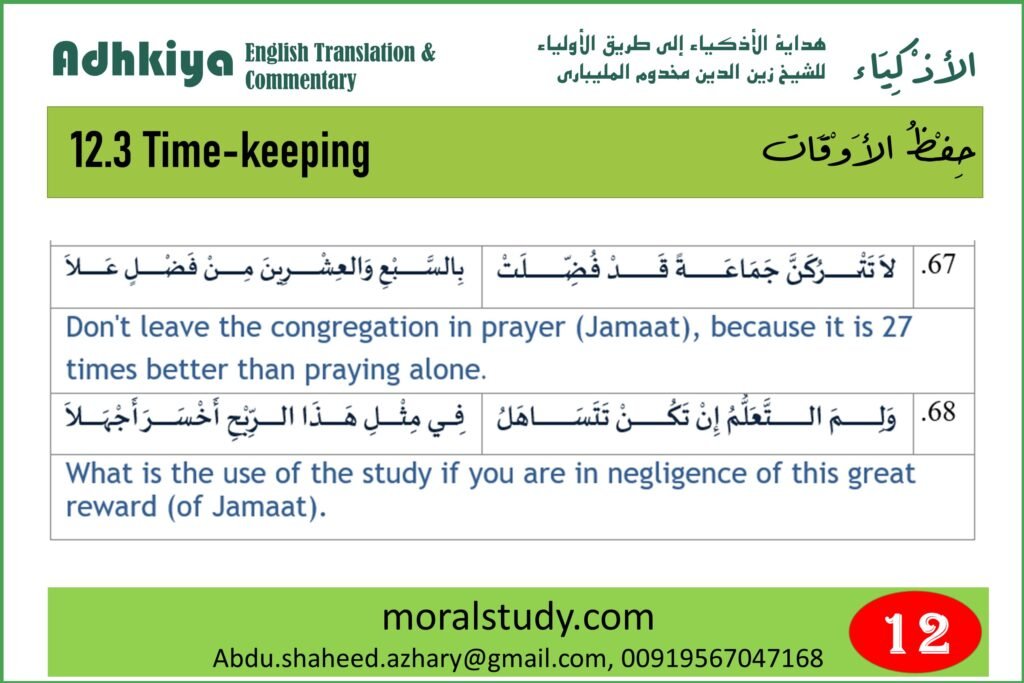Some people think that free time should be used for some kind of entertainment and that they are not accountable to Allah for the little time they spend in amusement. For them, free time means doing things that give them some kind of relaxation. They spent their free time watching television, browsing the internet, in movie theaters, reading books, etc without thinking whether Halal or Haram.
Most people are not aware of the fact that free time is also part of one’s life and thus can be questioned in the hereafter. Spending your free time in amusement is allowed, but it should be within Islamic boundaries. Islam never accepts spending a few seconds on non-Islamic activity. The Prophet says:
There are two blessings that many people do not make the most of and thus they become losers: good health and free time.
A person will perform god-pleasing actions once he falls ill, but after his recovery, he simply becomes lazy and idle; that is why the prophet called him a ‘loser’.
Some people think that Allah only rewards deeds like prayer (Salaat) and fasting (Sawm). Eating, washing and cleaning are just worldly affairs. The Author wants to confirm to them that deeds like eating and washing turn into reward-deserving activities if he simply does ‘Niyyat’; that is, to intend that he is doing the act for the sake of worship or for improving the quality of the worship.
Dividing time among different tasks is one of the most effective ways to manage the time. The Author suggests allocating a specific time for each task. Ask any personality development mentor about the importance of mastering time management skill. Doing things according to a pre-defined set of orders is very important. The author suggests a model for how to manage time.
Subh Prayer in Congregation (صَلاَة الصُّبْحِ جَمَاعَةً)
After the author suggested making a good schedule to the life, he began describing it. The best part of the day is its beginning time. You should start your day off in a way that inspires you to indulge in greater creativity and productivity. A healthier morning routine will help increase the mood for whole day. The meditation is effective at the time of morning because mind is not yet occupied with anything. Nobody will disturb you with phone or visiting at that time.
According to the author, early morning begins with Sabah (Dawn) prayer. The time of Subh prayer begins with the appearance of second dawn (means Fajr Saadiq or true dawn) and remains until sunrise. Immediately after the dawn, one has to offer ‘Subh’ prayer. Strict meditation should be accompanied with that prayer. It includes:
· Praying in pious reverence.
· Reading the Quran in Salaat thinking about its meaning.
· Perform it in the perfect manner with all Sunan (recommended things).
Chances are that you lose focus and concentration during the time of prayer, so try your hardest not to miss it. Your heart should be occupied with the thoughts of Allah.
The optimum way to maintain concentration in prayer is to realize that Allah is watching him during prayer. Don’t ever forget it.
Prayer in congregations is better, because it has more virtues.
Earning knowledge is meaningless if one does not care about the virtue of congregation prayer.
These are some prophetic sayings that reveal the importance of Fajr prayer:
عن أَبِي هُرَيْرَةَ، قَالَ قَالَ النَّبِيُّ صلى الله عليه وسلم “ لَيْسَ صَلاَةٌ أَثْقَلَ عَلَى الْمُنَافِقِينَ مِنَ الْفَجْرِ وَالْعِشَاءِ، وَلَوْ يَعْلَمُونَ مَا فِيهِمَا لأَتَوْهُمَا وَلَوْ حَبْوًا، لَقَدْ هَمَمْتُ أَنْ آمُرَ الْمُؤَذِّنَ فَيُقِيمَ، ثُمَّ آمُرَ رَجُلاً يَؤُمُّ النَّاسَ، ثُمَّ آخُذَ شُعَلاً مِنْ نَارٍ فَأُحَرِّقَ عَلَى مَنْ لاَ يَخْرُجُ إِلَى الصَّلاَةِ بَعْدُ [1]
The Prophet said, “No prayer is harder for the hypocrites than the Fajr and the `Isha’ prayers, and if they knew the reward for these prayers at their respective times, they would certainly present themselves (in the mosques) even if they had to crawl.” The Prophet added, “Certainly I decided to order the Mu’adhinin (Adhaan Caller) to call words of Iqama and order a man to lead the prayer and then use the flame to burn all those who had not left their houses so far for the prayer along with their houses.”
Prayer constitutes the most important form of worship in Islam. To demonstrate reverence (Khushoo) in Salaath, Allah has asked the believers to do some pre-homework before going to Salaat. First, he listens to the call of Mu’addin, and then performs an ablution followed by its prayers. When he begins the Salaat he proclaims that everything in this world is less important. He says ‘Allah is Great’ (Allah Akbar).
Another hadith says:
مَنْ صَلَّى الصُّبْحَ فِي جَمَاعَةٍ فَهُوَ فِي ذِمَّةِ اللِه تَعَالَى
Whoever prays Fajr is in the protection of Allah[2]
The presence of Allah in the heart is the most important characteristic of a prayer. The person speaks directly with his Lord, who knows his inner feelings and thoughts. Imagine an employee who turns his face right and left when talking with his manager without any respect; does the manager reward and promote such staff? The same applies here: Allah will reduce the reward for those who neglect the presence of Allah while praying.
The Prophet says:
إنَّ العَبْدَ لَيُصَلَّي الصَّلاةَ لا يُكْتَبُ لَهُ نِصْفُهَا. وَلا ثُلُثُهَا وَلَا رُبُعُهَا وَلَا خُمُسُهَا ولا سُدُسُهَا وَلا عُشْرُها [3]
If a servant performs the prayer, half of it is not recorded for him. Neither a third of it, nor a quarter of it, nor a fifth of it, nor a sixth of it, nor a tenth of it.”
Another quote says:
إِنَّمَا يُكْتَبُ للعَبْدِ مِنَ صَلاِتِهِ مَا عَقَل َمِنْهُ
Only prayers done with piety are recorded for servant.
Congregational prayer is very important; following the hadith proves it:
جَاءَ أَعْمَى إِلَى رَسُولِ اللَّهِ صلى الله عليه وسلم فَقَالَ إِنَّهُ لَيْسَ لِي قَائِدٌ يَقُودُنِي إِلَى الصَّلاَةِ فَسَأَلَهُ أَنْ يُرَخِّصَ لَهُ أَنْ يُصَلِّيَ فِي بَيْتِهِ فَأَذِنَ لَهُ فَلَمَّا وَلَّى دَعَاهُ قَالَ لَهُ ” أَتَسْمَعُ النِّدَاءَ بِالصَّلاَةِ ” . قَالَ نَعَمْ . قَالَ ” فَأَجِبْ ”[4] .[5]
There came to the Messenger of Allah (ﷺ) a blind man and said: Messenger of Allah, I have no one to guide me to the mosque. He, therefore, asked. Allah’s Messenger (ﷺ) permission to say prayer in his house. He (tee Holy Prophet) granted him permission. Then when the man turned away he called him and said: Do you hear the call to prayer? He said: Yes. He (the Prophet then) said: Respond to it.
One hadith says;
لَقَدْ هَمَمْتُ أَنْ آمُرَ بِالصَّلاَةِ فَتُقَامَ ثُمَّ آمُرَ رَجُلاً فَيُصَلِّيَ بِالنَّاسِ ثُمَّ أَنْطَلِقَ مَعِي بِرِجَالٍ مَعَهُمْ حُزَمٌ مِنْ حَطَبٍ إِلَى قَوْمٍ لاَ يَشْهَدُونَ الصَّلاَةَ فَأُحَرِّقَ عَلَيْهِمْ بُيُوتَهُمْ بِالنَّارِ[6]
Abu Hurairah reported the Messenger of Allah (ﷺ) as saying; I thought to give orders for arranging prayer in congregation, and then to have the Iqamah called for it, then to order a man to lead the people in prayer, then to go off in company of the people who have bundles of firewood to those people who are not present at the prayer and then to burn down their houses with fire.


